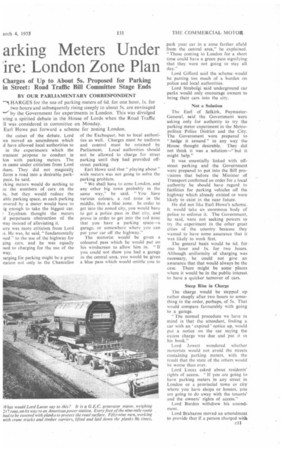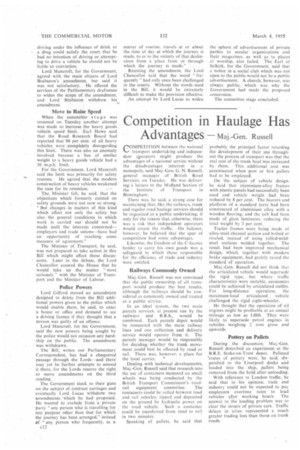arking Meters Under ire: London Zone Plan
Page 49

Page 50

If you've noticed an error in this article please click here to report it so we can fix it.
Charges of Up to About 5s. Proposed for Parking in Street: Road Traffic Bill Committee Stage Ends
BY OUR PARLIAMENTARY CORRESPONDENT HARGES for the use of parking meters of 6d. for one hour, is. for
two hours-and subsequently rising steeply to about 5s. are envisaged `-'1' by the Government for experiments in London. This was divulged tring a spirited debate in the House of Lords when the Road Traffic 11 was considered in committee on Monday.
Earl Howe put forward a scheme for zoning London.
the outset of the debate, Lord len moved an amendment which d have allowed local authorities to in the experiments which the !rnment propose to conduct in Ion with parking meters. The rs came under criticism from Lord iham. They did not magicallx form a road into a desirable parkpace, he said.
rking meters would do nothing to rze the numbers of cars on the ts, but they would reduce the able parking space, as each parking • overed by a meter would have to ig enough to take the biggest car.
Teynham thought the meters .d perpetuate obstruction of the way instead of alleviating it.
len was more criticism from Lord s. He was, he said, "fundamentally ised " to the use of the highway for ging cars, and he was equally ised to charging for the use of the way.
targing for parking might be a great itation riot only to the Chancellor
of the Exchequer, but to local authorities as well. Charges must he uniform and control must be retained by Parliament. Local aulhorities should not be allowed to charge for street parking until they had provided offstreet parking.
Earl Howe said that" playing about with meters was not going to solve the parking problem.
"We shall have to zone London, and any other big town probably in the same way," he said. " You have various colours, a red zone in the middle, then a blue zone. In order to get into the zoned city, you would have to get a police pass in that city, and prove in order to get into the red zone that you have a parking space—a garage. or somewhere where you can put your car off the highway."
The motorist would be given a coloured pass which he would put on his windscreen to allow him in. "If you could not show you had a garage in the central area, you would be given a blue pass which would entitle you to
park your car in a zone farther afield from the central area," he explained. "Those coming to London for a short time could have a green pass signifying that they were not going to stay all day."
Lord Gifford said the scheme would be putting too much of a burden on police and local authorities.
Lord Strabolgi said underground car parks would only encourage owners to bring their cars into the city.
Not a Solution
The Earl of Selkirk, PaymasterGeneral, said the Government were asking only for authdrity to try the parking meter experiment in the Metropolitan Police District and the City. The Government were prepared to hedge it around" in any way the House thought desirable. They did not think it was a solution—" but it might help."
It was essentially linked with offstreet parking and the Government were prepared to put into the Bill provisions that before the Minister of Transport confirmed an order for a-local authority he should have regard to facilities for parking vehicles off the highway which already existed or were likely to exist in the near future.
He did not like Earl Hovve's scheme. It would take an enormous body of police to enforce it. The Government, he said, were not seeking powers to try the experiment in the other great cities of the country because they wanted to have some assurance that it was likely to work first.
The general basis would be fid. for • one hour and Is. for two hours. Although uniformity of charging was necessary, he could not give an assurance that that would always be the case. There might be some places where it would be in the public interest. to have a quicker turnover of cars.
Steep Rise in Charge
The charge would be stepped up rather steeply after two hours to something in the order, perhaps, of 5s. That would compare favourably with going to a garage.
The normal procedure we have in mind is that the attendant, finding a car with an expired' notice up, would put. a notice on the car saying the excess charge was due and put it in his book."
Lord Jowett wondered whether motorists would not avoid the streets containing parking meters, with the result that the state of the others would be worse than ever.
Lord Lucas asked about residents' rights of access. "If you arc going to have parking meters in any street in London or a provincial town or city where you have shops or houses, you are going to do away with the tenants' and the owners' rights of access."
Lord Burden withdrew his amendment.
Lord Brabazon moved an amendment to provide that if a person charged with cl I
driving under the influence of drink or a drug could satisfy the court that he had no intention of driving or attempting to drive a vehicle he should not be liable to conviction, Lord Mancroft, for the Government, agreed with the main objects of Lord Brabazon's amendment, but said it was not satisfactory. He offered the services of the Parliamentary draftsmen to widen the scope of the amendment, and Lord Brabazon withdrew his amendment.
Move to Raise Speed
When the committee stage was resumed on Tuesday another attempt was made to increase the heavy goods vehicle speed limit. Earl Howe said that the Road Research Board had reported that 94 per cent. of all heavy vehicles were completely disregarding this limit. There was also an anomaly involved because a bus of similar weight to a heavy goods vehicle had a 30 m.p.h. limit.
For the Government, Lord Mancroft said the limit was primarily for safety reasons, He agreed that the modern construction of heavy vehicles weakened the case for its retention.
The Minister felt, he said, that the objections which formerly existed on safety grounds were not now so strong. " But changes in matters of this kind which affect not only the safety but also the general conditions in which work is carried out should not be made until the interests concerned— employers and trade unions—have had an opportunity of reaching some measure of agreement."
The Minister of Transport. he said, was not prepared to take action in this Bill which might affect those discussions, Later in the debate, the Lord Chancellor assured the House that he would take up the matter " roost seriously" with the Minister of Transport and the Minister of Labour.
Police Powers Lord Gifford moved an amendm'ent designed to delete from the Bill additional powers given to the police which would enable them, he said, to enter a house or office and demand to see a driving licence if they thought that a person was guilty of an offence.
Lord Mancroft, for the Government, said the new powers being sought by the police would not occasion any hardship on the public. The amendment. was withdrawn.
The Bill, writes our Parliamentary Correspondent, has had a chequered passage through the Lords—and there may yet be further attempts to amend it there, for the Lords reserve the right to move amendments on the third reading.
The Government stuck to their guns on the subject of contract carriages and eventually Lord Lucas withdrew two amendments which he had proposed. He wanted to exclude from a private party "any person who is travelling for any Purpose other than that for which the journey has been arranged," instead of "any person who frequently, as a c12
matter of routine. travels at or about the time of day at which the journey is made, to or to the vicinity of that destination from a place from or through which the journey is made."
Resisting the amendment. the Lord Chancellor said that the word "frequently "had only once been challenged in the courts. Without the words used in the Bill, it would be extremely difficult to make the provision effective.
An attempt by Lord Lucas to widen
the sphere of advertisement of private parties to secular organizations and their magazines, as well as to places of worship, also failed. The Earl of Selkirk, for the Government. said that a notice in a social club which was not open to the public would not be a public advertisement. A church, however, was always public, which was why the Government had made the proposed concession.
The committee stage concluded.












































































































